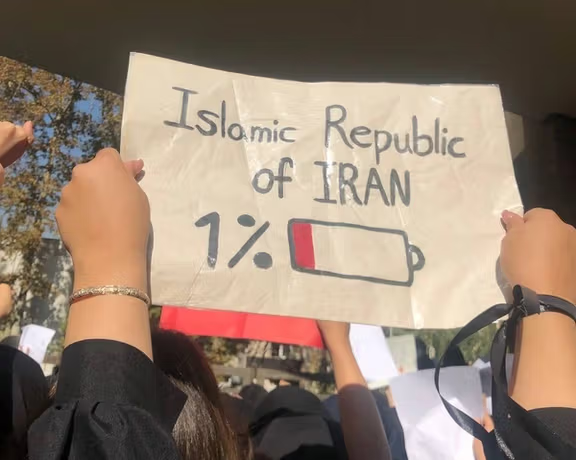Iranians Increasingly Reject Khomeini’s Legacy, 1979 Revolution

The weakening of the Islamic Republic’s legitimacy among Iranians is most evident in increasingly bold statements against its founder, Ayatollah Ruhollah Khomeini.

The weakening of the Islamic Republic’s legitimacy among Iranians is most evident in increasingly bold statements against its founder, Ayatollah Ruhollah Khomeini.
Younger people seeing their deteriorating economic situation in Iran, and those who have left their country for exile abroad, blame the 1979 revolution for their hardships.
Many former revolutionaries who wholeheartedly supported Khomeini in 1978-1979, as the father-figure of the revolution, sooner or later admitted that he hijacked what they believed was a revolution for democracy, social equity, and non-alignment in international relations. They accuse him of purging loyal revolutionaries and setting up a dictatorial clerical regime, with Islamic rule.
Some former regime supporters, who avoid criticizing Khomeini, have vehemently turned against his successor, Supreme Leader Ali Khamenei, labeling him as the enemy of the people.
Khamenei has also become a hated figure among many younger Iranians, to the degree that university students protesting on campus last year unleashed the worst derogatory and unheard-of insults at him. Most of the slogans during the protests were in fact political and even sexual insults directed at Khamenei, such as, “Khamenei the dictator”, the “bloodsucker”, the killer of the youth, just to mention some of the political statements.
Top regime insiders have come to admit that “the sanctities” of the revolution have been badly assaulted and lately they have tried to at least save Khomeini’s reputation.
Last week, Khomeini’s grandson, Hassan Khomeini had to address the issue of increasing disdain for his grandfather by speaking to local media. He said to blame Ruhollah Khomeini for today’s economic and social crises is unfair, and the younger generations are not aware of his philosophy and personality.
However, for many Iranians, facts speak for themselves. The Iranian economy has persistently deteriorated since Khomeini established the Islamic Republic. While before the revolution incomes were rising and the Iranian rial was a stable and strong currency, in 44 years it has declined from 70 rials per US dollar to 500,000. The inflation rate has seldom been single-digit, with consistently above 40-percent annual rate in the past five years. Around 1.5 trillion dollars in oil income has evaporated in four decades, with Iran having little to show for it. Iran’s GDP in the past year was less than half of Turkey’s and Saudi Arabia’s, with no prospects for improvement. Even without sanctions, the economy would be seriously under-productive, with the government, clerical foundations and the military controlling 80 percent.
On top of economic hardship, younger Iranians with access to information in the Internet and social media era, deeply resent to be told how to live by clerics whose education and worldview is limited to half-mythical Islamic teachings from the 7th and 8th centuries.
Another senior cleric, Mohammad Ali Movahedi Kermani, Tehran's interim Imam for Friday Prayers responding to attacks on Khomeini stated last week that "Such claims are unfounded, and the public does not subscribe to them. People recognize [Ayatollah Ruhollah] Khomeini as a divine and spiritual figure who dedicated himself to service."
But many Iranians not only reject Ayatollah Khomeini, but they also even strongly dislike former US President Jimmy Carter who is perceived as having abandoned the Shah in 1979 and indirectly helped the Islamists to gain power. A young female user wrote on ‘X’: “You betrayed the late Shah of Iran and helped Khomeini to power. You deserve a miserable life and I hope you will never be happy, any second of this life, for what you did to generations of Iranian people and the whole middle east.”